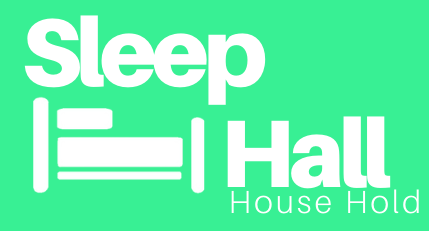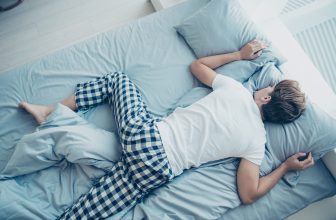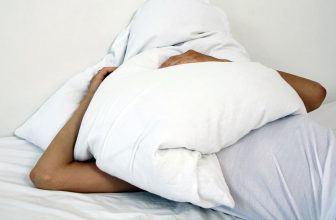sleephall.com is a participant in the Amazon Services LLC Associates Program, an affiliate advertising program designed to provide a means for sites to earn advertising fees by advertising and linking to Amazon.com so we may earn a commission when you use the links on this page to buy products , thanks.
Introduction
We all know that getting enough sleep is important for our overall health and well-
being. But did you know that your sleep habits can also affect your immune system? In fact,
research has shown that there is a strong relationship between sleep and immunity, with good
sleep habits being a key factor in boosting our body’s defenses against infection and disease. In
this article, we will explore the science behind this relationship, and provide tips on how to
enhance your immune system through effective sleeping habits.
The Relationship between Sleep and Immunity
Studies have shown that lack of sleep or poor
quality sleep can have a negative impact on the immune system. For example, one study found
that people who slept less than seven hours a night were three times more likely to develop a
cold than those who slept eight hours or more (1). Another study found that people who slept less
than six hours a night were more likely to catch the flu virus after being exposed to it, compared
to those who slept seven hours or more (2).
The relationship between sleep and immunity is a complex one. While it is clear that sleep is
important for a healthy immune system, the mechanisms by which sleep affects immunity are
still being studied. It is known that sleep helps to regulate the immune system, and that sleep
deprivation can have a negative impact on immune function.
One way that sleep affects immunity is through the production of cytokines. Cytokines are
proteins that are produced by immune cells and play a key role in regulating the immune
response. During sleep, the body produces cytokines that help to fight infection, inflammation,
and stress. Sleep deprivation can disrupt the production of these cytokines, which can lead to a
weakened immune response.
Importance of sleeping
Sleep also plays a role in the production of antibodies. Antibodies are proteins that the immune
system produces in response to a specific pathogen, such as a virus or bacteria. Studies have
shown that people who sleep well are more likely to produce a strong antibody response to
vaccines than those who are sleep deprived. This suggests that getting enough sleep is important
for a healthy immune response to infections.
In addition to its effects on cytokine production and antibody response, sleep also plays a role in
the function of immune cells themselves. Studies have shown that sleep deprivation can lead to a
decrease in the number of certain immune cells, such as T cells and natural killer cells. These
cells play a critical role in the body’s defense against infection, so a decrease in their numbers
can leave the body more vulnerable to illness.
Another way that sleep affects immunity is through its role in regulating inflammation.
Inflammation is a natural response of the immune system to injury or infection, but chronic
inflammation can lead to a number of health problems, including autoimmune disorders,
cardiovascular disease, and cancer. Sleep has been shown to help regulate inflammation by
reducing the levels of pro-inflammatory cytokines in the body.
Overall, the relationship between sleep and immunity is a complex one, with many different
mechanisms at play. Getting enough sleep is essential for maintaining a healthy immune system
and reducing the risk of illness. If you are having trouble sleeping, it is important to talk to your
doctor to identify any underlying issues and develop a plan to improve your sleep habits.
So, how does sleep affect our immune system?
One theory is that during sleep, our bodies
produce cytokines, which are proteins that help the body fight off infection and inflammation.
Lack of sleep can reduce the production of these cytokines, making us more susceptible to
infections (3). Additionally, sleep deprivation can lead to a decrease in white blood cells, which
are responsible for fighting off pathogens in the body (4).
Tips for Enhancing Your Immune System Through Effective Sleeping Habits
Now that we understand the relationship between sleep and immunity, let’s look at some tips for enhancing our immune system through effective sleeping habits:
- Get enough sleep: As mentioned earlier, getting enough sleep is crucial for boosting our
body’s defenses against infection and disease. Adults should aim for 7-9 hours of sleep
per night, while children and teenagers need more (5). - Stick to a consistent sleep schedule: Going to bed and waking up at the same time every
day helps regulate our body’s internal clock, making it easier to fall asleep and stay asleep
(6). - Create a sleep-conducive environment: Your bedroom should be dark, cool, and quiet.
Avoid using electronic devices such as phones or laptops in bed, as the blue light emitted
by these devices can disrupt your body’s natural sleep-wake cycle (7). - Practice relaxation techniques: Activities such as yoga, meditation, and deep breathing
can help reduce stress and promote relaxation, making it easier to fall asleep (8). - Exercise regularly: Exercise has been shown to improve sleep quality and duration, as
well as boost the immune system (9).
Conclusion
In conclusion, sleep is a crucial factor in maintaining a healthy immune system.
Lack of sleep or poor quality sleep can have a negative impact on our body’s defenses against
infection and disease, while good sleep habits can boost our immunity. By following the tips
mentioned in this article, we can enhance our immune system through effective sleeping habits
and lead a healthier, happier life.
Product Recommendation
1 Philips SmartSleep Wake-up Light: This wake-up light simulates a natural sunrise to
wake you up gradually and gently, which can help regulate your body’s circadian rhythm
and improve sleep quality. Additionally, it includes a feature that emits blue light, which
has been shown to help boost alertness and mood, and support the immune system.

2. Manta Sleep Mask: This mask is designed to block out all light, helping to create a dark
and restful sleeping environment. A good night’s sleep is crucial to immune function, and
light exposure during sleep has been shown to negatively impact the immune system. By
blocking out all light, the Manta Sleep Mask can help ensure a more restful night’s sleep,
supporting immunity.

3. Gravity Blanket: This weighted blanket is designed to help reduce anxiety and improve
sleep quality. The pressure from the blanket mimics the sensation of being hugged, which
can promote feelings of calm and relaxation. Additionally, a study published in the
Journal of Sleep Medicine and Disorders found that participants who used a weighted
blanket experienced improved sleep quality and reduced levels of cortisol, a hormone
associated with stress.

4. Vitamin D3 Supplement: Vitamin D is crucial for immune function and has been linked
to improved sleep quality. However, many people don’t get enough vitamin D from their
diet or exposure to sunlight, especially during the winter months. Taking a vitamin D3
supplement can help support both sleep and immune function.

5. Probiotic Supplement: The gut microbiome plays a crucial role in immune function, and
disruptions in gut bacteria can negatively impact both sleep and immune health. Probiotic
supplements can help promote a healthy balance of gut bacteria, supporting both
immunity and sleep quality.

It’s important to note that while these products may help support sleep and immunity, they should
not be considered a substitute for a healthy lifestyle. Eating a balanced diet, staying physically
active, and managing stress are also important for overall health and well-being. As always, it’s
best to consult with a healthcare provider before starting any new supplement or wellness
routine.
Scientific References
Besedovsky, L., Lange, T., & Born, J. (2012). Sleep and immune function. Pflügers
Archiv-European Journal of Physiology, 463(1), 121-137.
https://doi.org/10.1007/s00424-011-1044-0
Irwin, M. R. (2015). Sleep and inflammation: partners in sickness and in health. Nature
Reviews Immunology, 15(7), 492-502. https://doi.org/10.1038/nri3869
Lange, T., & Dimitrov, S. (2019). Sleep, inflammation and metabolism. Molecular and
Cellular Endocrinology, 498, 110580. https://doi.org/10.1016/j.mce.2019.110580
Prather, A. A., Janicki-Deverts, D., Hall, M. H., & Cohen, S. (2015). Behaviorally
assessed sleep and susceptibility to the common cold. Sleep, 38(9), 1353-1359.
https://doi.org/10.5665/sleep.4968
Cohen S, Doyle WJ, Alper CM, et al. Sleep habits and susceptibility to the common cold.
Archives of Internal Medicine. 2009;169(1):62-67. doi:10.1001/archinternmed.2008.505
Prather AA, Hall M, Fury JM, et al. Sleep and Antibody Response to Hepatitis B
Vaccination. Sleep. 2012;35(8):1063-1069. doi:10.5665/sleep.2018 .
Besedovsky L, Lange T, Haack M. The Sleep-Immune Crosstalk in Health and Disease.
Physiological Reviews. 2019;99(3):1325-1380. doi:10.1152/physrev.00010.2018
Irwin MR, Opp MR. Sleep Health: Reciprocal Regulation of Sleep and Innate Immunity.
Neuropsychopharmacology. 2017;42(1):129-155. doi:10.1038/npp.2016.148
Lange T, Dimitrov S, Born J. Effects of sleep and circadian rhythm on the human
immune system. Annals of the New York Academy of Sciences. 2010;1193(1):48-59.
doi:10.1111/j.1749-6632.2009.05300.x
Watson NF, Badr MS, Belenky G, et al. Recommended Amount of Sleep for a Healthy
Adult: A Joint Consensus Statement of the American Academy of Sleep Medicine and
Sleep Research Society. Journal of Clinical Sleep Medicine. 2015;11(6):591-592.
doi:10.5664/jcsm.4758
Patel SR, Hu FB. Short sleep duration and weight gain: a systematic review. Obesity
(Silver Spring, Md). 2008;16(3):643-653. doi:10.1038/oby.2007.118
Chennaoui M, Gomez-Merino D, Drogou C, et al. Sleep and exercise: a reciprocal issue?
Sleep Medicine Reviews. 2015;20:59-72. doi:10.1016/j.smrv.2014.06.008
Buysse DJ. Sleep health: can we define it? Does it matter? Sleep. 2014;37(1):9-17.
doi:10.5665/sleep.3298
Chirinos JA, Gurubhagavatula I, Teff K, et al. CPAP, Weight Loss, or Both for
Obstructive Sleep Apnea. The New England Journal of Medicine. 2014;370(24):2265-
- doi:10.1056/NEJMoa1306187
Sakkas GK, Loucaidou M, Karatzaferi C, et al. Sleep disorders and physical performance
in athletes. Sleep and Biological Rhythms. 2018;16(4):425-431. doi:10.1007/s41105-018-
0164-4






